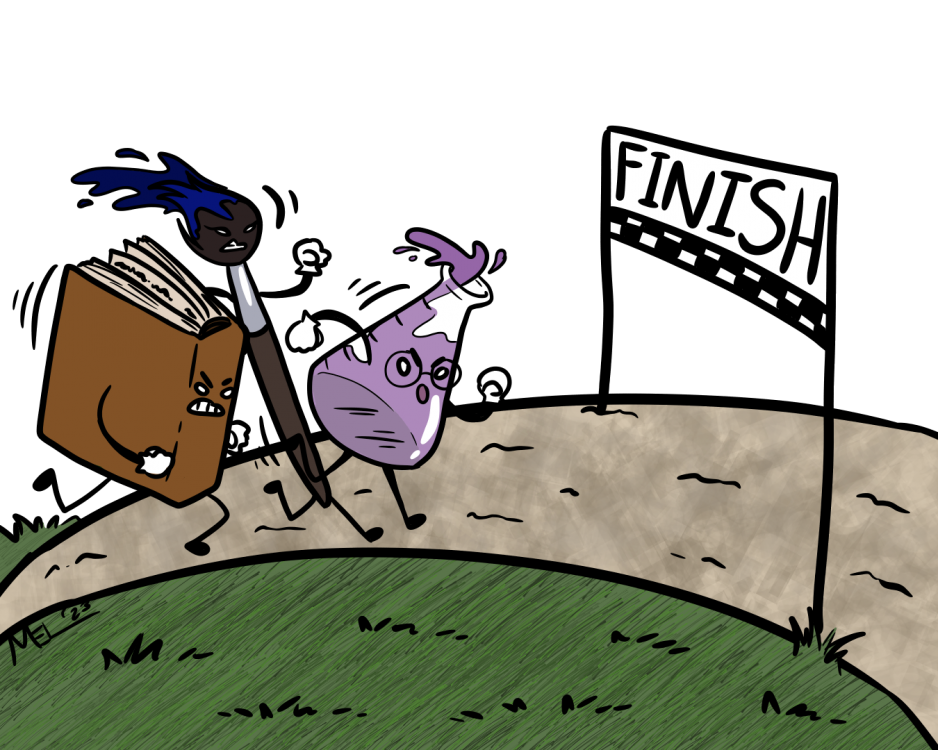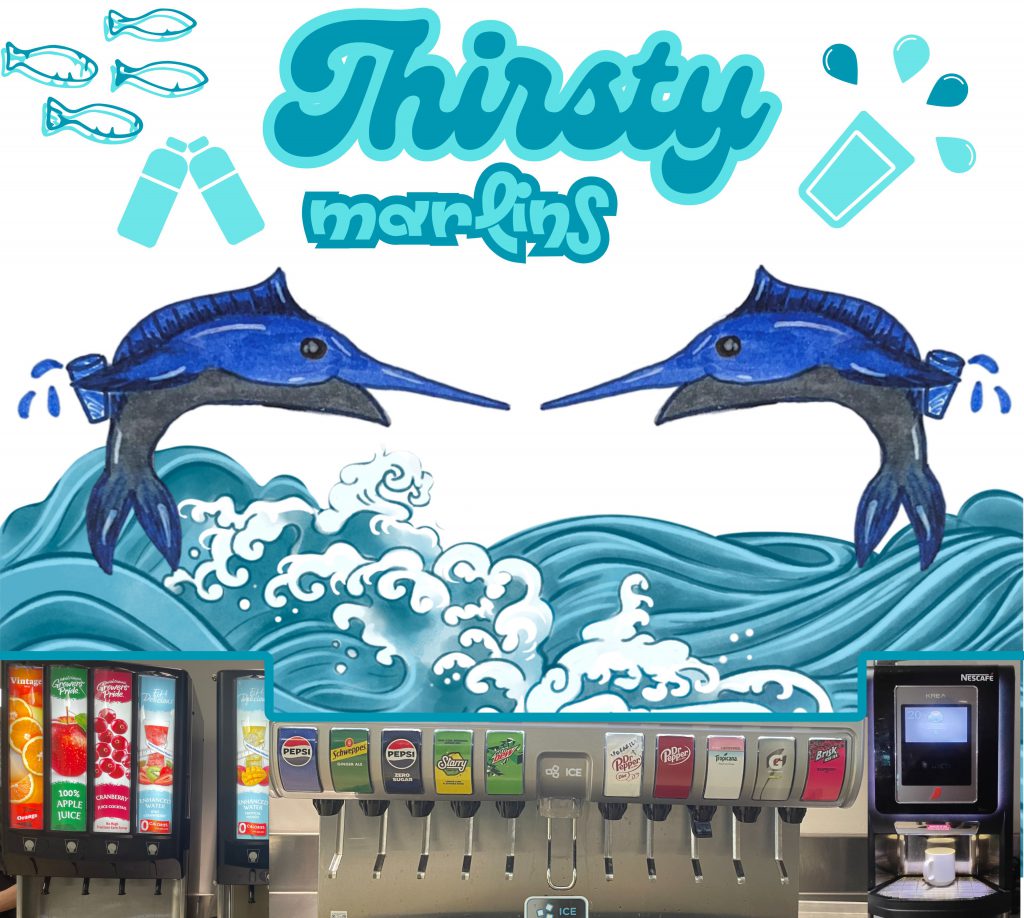All illustrations designed by Mel Lhuillier.
All photos taken by Madelyn Yale.
Want security? Choose STEM
One of the most important decisions you’ll make while you’re at college is deciding what to major in. There are a lot of options, and each has its merits, but as someone studying Computer Science and Mathematics, I can easily advocate for any kind of STEM major.
STEM is a broad term that encompasses a lot of different majors and careers, but they all offer a ton of benefits.
Most people know that these careers can almost guarantee financial security; there are a lot of high-paying jobs in technology and engineering, and new ones are being created every day. What we often forget, however, is that STEM is a great option for those looking to make a difference in the world.
We can’t save the environment without someone to study it, and we can’t cure cancer without someone to research it.
Without a doubt, STEM spans a variety of lucrative careers. The field is always changing and growing, and there will always be new careers to explore in engineering and technology.
By the time you graduate, there will be STEM jobs you never could have imagined as a freshman. These jobs will span almost every industry, so you can find a career combining STEM with nearly any other interests.
Everyone from sports teams to amusement parks are now looking for STEM graduates. As the world evolves and adapts to new technological advances, industries that wouldn’t have had anything to do with STEM just a few decades ago are finding they have a need for it. Most of these positions will also be high-paying, so going into STEM is an easy way to guarantee financial stability without becoming stuck in boring, unfulfilling positions. With a STEM major, you can graduate knowing that you’ll be able to find a job you enjoy with a sizable paycheck.
Another benefit of the variety in STEM careers is that there’s no shortage of ways to get involved with your preferred social issue.
No matter your mission statement, effective use of technology is almost necessary for success in the twenty-first century. Nonprofits need someone to build their website; politicians need someone to analyze polling data. If you’re worried about climate change, we need scientists to study the environment and design more sustainable energy sources. If you’re concerned about the rise in infectious diseases, now more than ever we need people to study viruses like COVID-19 and learn how to prevent another pandemic.
Odds are, if you have a cause you’re passionate about, there exists a space for STEM in that movement, all you have to do is find it.
Deciding what you want to do for the rest of your life can be daunting, especially for a college student, but choosing one of our STEM majors gives you a lot of options post-graduation. The world will always need more doctors and scientists, someone to design and fix our smartphones, engineers to design new bridges and airplanes and someone to create the next big technological advancement.
Whatever your priorities for your future are, be it financial security, a meaningful career or the ability to promote change, studying STEM now is a great way to turn those dreams into reality.

Bio: Katelyn Baines is a junior and Computer Science and Mathematics double major. She enjoys participating in Virginia Wesleyan’s Theatre productions. She can be contacted at kabaines@vwu.edu.
By Katelyn Baines
kabaines@vwu.edu
Psych majors not only understand others, but better the world

Why is being a business and psychology double major and a sociology minor the best? Simply put, it makes me feel the most me. It compliments my interests and allows me to wander and be surrounded by the things I am curious and passionate about. Through this, I am able to intertwine them and transform them with my own ideas. Also, I only had to take one lab.
Despite how some people may feel about business majors and our workload, we live in a society that functions on businesses to put food on our plates and clothes on our backs, making an understanding of business extremely worthwhile.
The services we provide can be utilized by others and we can work together to produce things more efficiently as we specialize in our crafts.
However, there are many downsides to this system as we are plagued by consumptionism, and there are human and environmental abuses all over the place. By prioritizing profit over people, businesses have made a huge disconnect in communities.
With this in mind, I would like to create something that is more meaningful and centered around helping more people instead of solely helping to fill my own pockets.
By taking business courses, I have been able to expand my understanding on the way the business world works and how we depend and impact one another.
In society, we are majorly unaware of the individual mental processes that go on inside people’s heads. Each person is so unique and special and has a mind entirely of their own. I deeply feel like this uniqueness could be utilized and embraced in creating a more inclusive understanding of one another.
By majoring in psychology, I have deepened my own understanding of myself and others and have allowed myself to fully empathize with the feelings and struggles of individuals.
Correspondingly, mental health is something I find incredibly important and relevant as we are a society that prioritizes individualism but fails to support individuals in need. By better understanding one another, it can help us to better treat one another.
I am thankful that psychology has opened my mind to more ways of thinking and can potentially aid me in the way I interact with others.
Our social interactions are incredible and impactful to the way we interpret and see our own realities. They are a main component of our species’ survival and contribute heavily to the quality of our lives.
Through sociology, I have developed a better understanding of a spectrum of inequalities of race, gender, sexuality and social class on the micro and macro level of society. I have gained insight to how social norms, values and ideals influence our behaviors and beliefs.
I hope to create an impact on our society and contribute to the development of a more inclusive and connected place.
For my plans on how to utilize my knowledge after school, my dream would be to create a community-based local business. Community-based businesses, with their connectivity with the local community and their positive impacts, are deeply moving.
By supporting other local businesses, instead of out-competing them, and valuing employees by providing them with helpful resources to succeed, there are further benefits to the local economy as well.
For example, Erin Dougherty, a local small business owner of Eleanor’s Norfolk, a feminist bookstore and bottle shop, creates a safe space for community activism, engagement and learning. She demonstrates how there can be ethical businesses that thrive and I hope I can do something like this too one day.
Hopefully, my majors and minor will really help me create this space.

Kaitlyn Duswalt is a sophomore Business and Psychology major with a Sociology minor. She enjoys riding her skateboard and going to the beach. She can be reached at kmduswalt@vwu.edu.
By Kaitlyn Duswalt
kmduswalt@vwu.edu
Under-appreciated English majors are the new innovators

“What are you gonna do with an English major?”
This is a question I was asked repeatedly in high school, especially because I decided that I would not pursue an education in engineering past graduating from the Project Lead the Way program. In the twenty-first century, there has been a significant increase in the emphasis placed on STEM-based careers, and with good reason.
The advancement of technology in recent decades has created countless job opportunities, and global reliance on technology implies a certain level of job security that other career fields don’t. STEM-based careers tend to pay incredibly well, too, and many positions don’t require a traditional degree. Therefore, a person can spend less money to become certified for a job that pays better than most, reducing the amount of debt that one might accrue through a traditional higher education.
For those who do choose to pursue a college degree, there is a great deal of funding for STEM students—especially for women in STEM. So, who would turn away from the opportunity to obtain a high-paying job for a cheaper education?
I would. I did. And I don’t regret it in the slightest.
Careers in the arts continue to get a bad rap for being unstable, underpaying, unattainable and even unrespectable. Thus, students pursuing creative arts degrees are perceived by some as wasting their time and money. English students, in particular, are seen as limited in their options post-graduation.
At fourteen-years-old, I was told that, should I earn a degree in English, my only two options would be authorship or education. It takes months, even years, to write a book—it takes even longer to revise and publish it. Once you’ve got the finished product, there’s no guarantee that your time and hard work will be financially compensated. Similarly, becoming an educator requires even more time and money than a standard B.A., and while there is a dire need for teachers and the pay is adequate, there is a huge time commitment outside of the classroom, for which teachers are similarly financially uncompensated.
No occupation is perfect; every career path comes with its own pros and cons, and it is up to the individual to decide which benefits outweigh the consequences of a job. For me, it came down to passion, and though I was passionate about literature, at that time my passion extended to neither writing nor teaching.
I applied and was accepted into the Project Lead the Way program and saw it through to completion, even though I lacked passion for STEM, too.
I decided to return to my love of literature, and when I applied for college it was with the intention of earning a B.A. in English, despite the doubts of my peers that it would be a worthwhile investment.
Since then, I have learned something critical: every discipline needs English majors. Every peer-reviewed journal and scientific study has passed the inspection of an editor. Politicians need speechwriters. Tech-moguls need someone to write the user manual. State governments need curriculum-writers. English majors—arts majors—cannot be limited. Ours are not pipe-dreams only achievable by sheer luck or good publicity.
We are as necessary to innovation as those known publicly as innovators. Our options are endless, because strong communicators are necessary in every workplace.
What can you do with an English major? Anything you want.

Kayla Bissette is a senior English and Theater double major. She enjoys performing with the Virginia Wesleyan University Theater Department, including in their latest program, Airness. She is also a writing tutor in the Learning Center. She can be contacted at knbissette@vwu.edu.
By Kayla Bissette
knbissette@vwu.edu


